Anton Shekhovtsov's Blog
March 5, 2024
The anatomy of Russian disinformation operations in Germany
As I have argued elsewhere, the Russian marketing and political consulting firm called Social Design Agency (SDA) founded by Russian political technologist Ilya Gambashidze (sanctioned by the EU) is currently a major Russian organisation conducting malign influence operations in the Western media and public spaces. In particular, the SDA “was involved in one of the most insidious Russian disinformation international campaigns that was dubbed Operation Doppelganger and consisted in spreading false information using fake websites impersonating government organisations and international media”.
In response to the Russian leaks of the secret talks in the German Bundeswehr, in this post I detail SDA’s two disinformation operations targeting Germany. While I provide original names of these operations, I refer to them, for brevity’s sake, as (1) “German boots on the ground”, and (2) “German reparations to Poland”. The text below is an English translation of the SDA’s description of the two operations; my additional comments and clarifications are highlighted. This post aims to show the typical mechanics, principles and scenarios of Russian disinformation campaigns.

Original name of the operation: “Relatives of German military personnel protest against their expedition to Ukraine” (Verwandte deutscher Soldaten protestieren gegen die Entsendung ihrer Familienmitglieder in die Ukraine)
The form of the operation: A post on Facebook featuring a screenshot from WhatsApp [the SDA will produce a fake screenshot from the non-existent communication on WhatsApp and post it on Facebook along with the comments]
The text for the screenshot: “I’m in shock, I’m crying, I don’t know what to do. Martin said they’d be sent to Ukraine. We can’t talk about it, they signed a secret document. I asked him, why the hell, they were going to send only tanks. He said, there’s no point in sending tanks, the Ukrainians don’t know how to use them. And there’s no time to teach them. I don’t understand what to do!!! I don’t understand why my husband is being sent to this place??? Russia didn’t attack us, why do we have to fight??? And the meanest thing is that it’s forbidden to talk about it, or you’ll go to prison. I don’t know what to do! I’m ready to tear them all to pieces in Berlin if it helps!!! Tell me what to do!!!”.
The text for the Facebook post: “Are we through playing the war? Now they’re sending Germans into Ukraine! They’re forcing us to fight the Russians again! I heard about it before, but I didn’t believe it. Now I have to believe it. This is a screenshot of a message from a very good friend of mine. Her husband is a tank commander and he’s being sent to war. What should she do? Any advice?”
A note [from the SDA]: Texts do not have to be perfectly written. You can deliberately make a few mistakes – syntax, spelling, punctuation. The main thing is that they should not distort the meaning and perception.
(2) “German reparations to Poland”
Original name of the operation: “German government begins secret negotiations on reparations to Poland” (Die deutsche Regierung nimmt geheime Verhandlungen über Reparationen für Polen auf)
The form of the operation: Posts on Facebook + screenshots of news stories on Bild (https://www.bild.de/politik/inland/po...) [the SDA will produce a fake screenshot from a non-existent news story on Bild, one of the most popular German newspapers; the link given in the SDA’s instructions is a general link to the Bild‘s section on domestic politics]
The text for the screenshot: “The newspaper’s source in the German government office confirms the information that the Foreign Ministry is starting preliminary consultations with the Polish side on determining the amount of reparations. “We have taken into account the opinion of the US Congress on this issue and have started preliminary consultations with the Polish side. It has been decided not to make the negotiations public for the time being – this could lead to misunderstandings and negativity among citizens. But, in principle, the decision has been made, because partnership and good neighbourly relations with Warsaw, London and Washington are worth more, especially now,” the official said on condition of anonymity”.
Texts for Facebook bots [managed and coordinated by the SDA]:
A patriotic bot: “Disgraceful! For starters, we’ve already paid off the Poles. And, secondly, the ‘traffic light coalition’ should resign if they support this”.
A broke bot: “I don’t know where to get money for food and electricity. And now I have to find money for Poles? HAVE YOU GONE NUTS?”
An AfD supporter bot [AfD is the German far-right party “Alternative for Germany” – currently, it is the largest pro-Kremlin far-right party in Europe, along with Hungarian Fidesz of Viktor Orbán]: “This is total helplessness. Are we capitulating to London and Washington again? What reparations? Give us our eastern lands, Poles, and we will think how much we should charge you for your poor development of them!”.
A note [from the SDA]: The text of the comments should perhaps be translated in a more primitive way.
November 15, 2020
More evidence the Polish Center for Geopolitical Analysis was a Russian front
More evidence has now emerged suggesting that the Poland-based European Center for Geopolitical Analysis (Europejskie Centrum Analiz Geopolitycznych, ECAG) was an organisation handled by the Russian authorities.
The ECAG was founded in 2007 by a Polish far-right activist Mateusz Piskorski, then a member of the Polish populist party Self-Defence of the Republic of Poland (Samoobrona Rzeczpospolitej Polskiej). The activities of the ECAG were originally limited to providing authoritarian East European regimes with compliant “election observation” missions. (More on this see Chapter 4 in Russia and the Western Far Right) but later would be engaged in other pro-Kremlin efforts.
According to the investigation by the Organized Crime and Corruption Reporting Project, ECAG received €21,000 through Crystalord Ltd., a [Russian] Laundromat company, for “consulting services” in May 2013, despite the fact that Polish law prohibits the organization from carrying out for-profit business activities.
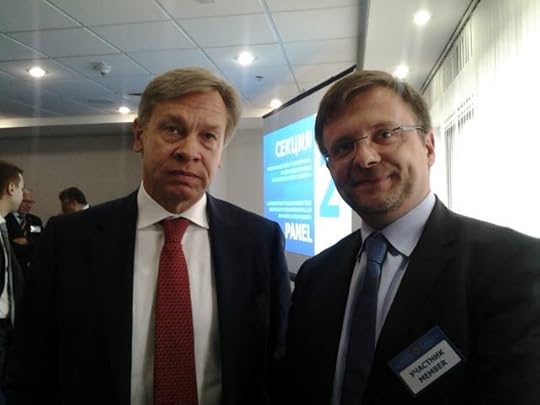
(left to right) Head of State Duma Foreign Affairs Committee Aleksey Pushkov and Mateusz Piskorski at Third International Parliamentary Forum held in Moscow on 26 June 2014
In March 2014, Piskorski co-organised an international “election observation” mission to “monitor” the illegitimate referendum in Ukraine’s Crimea followed by annexation of this Ukrainian territory by Russia. As he brought more than 30 “observers” to Crimea, Piskorski’s task at the “referendum” was, therefore, to demonstrate “international legitimacy” of Moscow’s actions. All these attempts failed because neither the “referendum” nor Russian annexation of Crimea has been recognised by the international community, including the United Nations.
Over the years, Piskorski had several Russian handlers. One of his long-term handlers was Aleksey Martynov, the director of the International Institute of the Newly Established States (IINES) – a Russian structure aiming to advance Moscow’s foreign policy interests by legitimising Russia-occupied territories such as Abkhazia and South Ossetia (Georgia), Transnistria (Moldova), and “Donetsk People’s Republic” and “Lugansk People’s Republic” (Ukraine) as sovereign states.
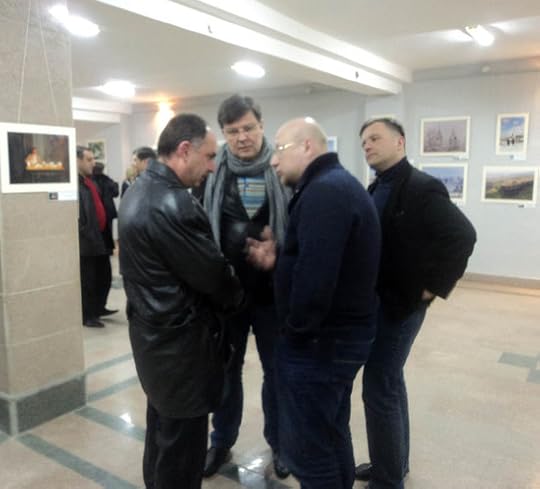
(left to right) Ashot Beglaryan, Aleksey Martynov, Modest Kolerov and Mateusz Piskorski in Nagorno-Karabakh in 2012
In spring 2014, as Russia occupied Crimea and started invading Eastern Ukraine, the Kremlin activated all its experts dealing with the post-Soviet space. At the centre of the Russian anti-Ukrainian strategy at that time was the Kremlin’s then major “political technologist” Vladislav Surkov – almost all Moscow’s high-level infowar activities with regard to Ukraine were either developed or endorsed by Surkov’s team. In March 2014, Martynov was introduced to Surkov’s team by a Kremlin’s political expert Oleg Matveychev, who was one of the organisers of the “international observation” at the “Crimean referendum” the same month. Cooperation with Martynov was personally endorsed, in April-May 2014, by Boris Rapoport, an important representative of Surkov’s team and a member of the Russian Presidential Administration.
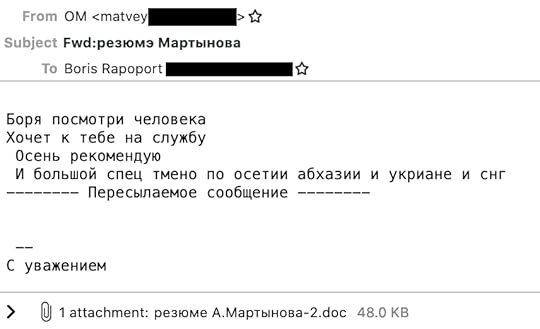
Oleg Matveychev introducing Aleksey Martynov to Boris Rapoport
When he started working with Surkov’s team, one of Martynov’s jobs was organising “international observation” of elections, in which Moscow had its stakes. As Ukraine prepared for the early presidential election in May 2014 (after former President Viktor Yanukovych had fled to Russia), Martynov sent a list of compliant “international observers” to Rapoport saying that they had been registered by Ukraine’s Central Election Commission (true) and that they were ready to go Ukraine and publicly criticise the elections afterwards for a fee of €20 thousand. (Note the decision to condemn the Ukrainian elections even before they actually took place!) The list of those “international observers” was compiled by Piskorski.

Aleksey Martynov sending a list of “international observers” to Boris Rapoport
In another message to Rapoport, Martynov discusses the potential involvement of Polish organisations in the information war against Ukraine. In particular, he mentions the Polish branch of the IINES (“we totally control it”, he writes) and the ECAG. The Polish branch of the IINES was co-founded by ECAG’s member Jacek Cezary Kamiński and Martynov himself.
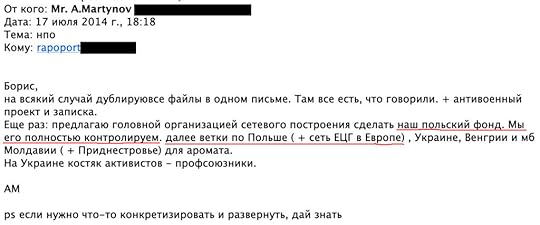
Aleksey Martynov suggesting to involve Polish networks in Russia’s information war against Ukraine
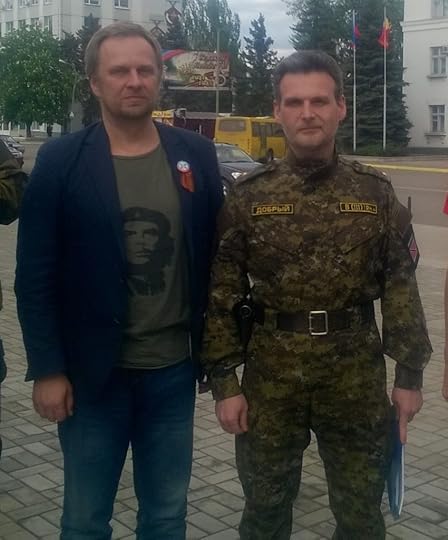
Jacek Kamiński (left) in Russia-occupied Eastern Ukraine together with a pro-Russian fighter
April 9, 2020
Foreign right-wing terrorism and American politics
Five years ago, I already wrote about the extreme-right Russian Imperial Movement (RIM) and the danger it posed internationally. And now, on the 6th of April this year, the US State Department designated the RIM, as well as three persons who were associated with this movement, as a Specially Designated Global Terrorists (SDGT). Explaining the State Department’s decision, Coordinator for Counterterrorism Ambassador Nathan Sales said that the RIM was “a terrorist group that provide[d] paramilitary-style training to neo-Nazis and white supremacists, and it play[ed] a prominent role in trying to rally likeminded Europeans and Americans into a common front against their perceived enemies”. Furthermore, Ambassador Sales noted that the RIM provided paramilitary training to Swedish persons who would, a few months later, become involved in a series of terrorist attacks in Gothenburg. Ambassador Sales also reminded that the RIM “was among the forces that [had] fought in Ukraine on behalf of the pro-separatist forces”. (I wrote about the RIM and the danger it posed five years ago.)
The State Department’s decision to designate the RIM as a SDGT is unprecedented: it is the first foreign extreme-right organization that was included in the list of SDGTs. This development is a result of the discussions about right-wing terrorism that intensified in the US after a series of troubling cases of extreme-right attacks in the US and around the world, and this article reflects upon some of these discussions.
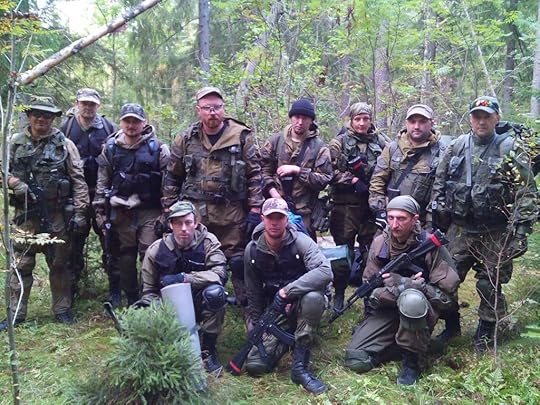
Participants of the RIM’s “Partisan” military courses, Russia, September 2015
On the 12th of February this year, the US House Committee on Homeland Security advanced the Transnational White Supremacist Extremism Review Act introduced by Congressman Max Rose, a decorated veteran of the war in Afghanistan. If adopted, the bill will “direct the Under Secretary for Intelligence and Analysis of the Department of Homeland Security to develop and disseminate a threat assessment regarding threats to the United States associated with foreign violent white supremacist extremist organizations”.
This is, indeed, a welcome initiative considering the rise of right-wing terrorism across the Western world. In 2019, an Australian neo-Nazi terrorist killed 51 and injured 49 people in what has become known as the Christchurch mosque shootings. The same year, an American far-right terrorist shot 22 and wounded 24 people at a Walmart store in El Paso, Texas. Also in 2019, a German member of the transnational neo-Nazi terrorist movement Combat 18 assassinated a German center-right politician Walter Lübcke, while already this year a German neo-Nazi killed 11 and injured five people at two shisha bars in Hanau.
According to the Global Terrorism Index 2019 published by the US-based Institute for Economics & Peace, far-right terrorism, while remaining “a small fraction of total terrorism worldwide”, has been increasing in Western Europe, North America and Oceania. The Index provides us with the frightening statistics: over the past five years, the total number of right-wing terrorist attacks have increased by 320%.
Despite the very clear dangers that far-right terrorism poses to Western societies, no right-wing extremist organization – until very recently – has been designated as an SDGT or a Foreign Terrorist Organization (FTO) by the US State Department that lists dozens of primarily Islamist, but also far-left and separatist, organizations and movements as FTOs. Fortunately, the discussion now moves in the right direction, and the National Strategy for Counterterrorism endorsed by President Donald Trump in 2018 does mention two overseas neo-Nazi organizations.
Max Rose’s proposed bill is yet another important contribution to the discussion. However, one can identify three potentially problematic aspects related to the bill itself and its implementation.
The bill defines “a foreign violent white supremacist extremist organization” – a concept at the core of the bill – as “an organization based outside the United States that seeks, wholly or in part, through unlawful acts of force or violence, to support a belief in the intellectual and moral superiority of the white race over other races”.
The first problematic aspect is that, in stark contrast to the instances of far-left and separatist terrorism, acts of far-right terrorism are carried out predominantly by people only loosely, if at all, affiliated with specific right-wing extremist organizations. The classical example here is the Norwegian neo-Nazi terrorist Anders Breivik, who carried out the second deadliest terrorist attack in history since the Bologna massacre in 1980 and yet was not a member of any political organization. Given the peculiarities of right-wing extremism and social behavior of far-right activists, much more attention should be paid to online resources that facilitate radicalization of individuals. The bill does mention online platforms, as it suggests that “appropriate owners and operators of online platforms” need to provide assistance “in identifying content that may be associated with a foreign violent white supremacist extremist organization”, but here, again, the focus is on far-right organizations, rather than online resources, which may be right-wing extremist by nature but still not associated with any organization.
Furthermore, despite attempts by some Western authorities to police social networks and other online platforms, these attempts are often belated. For example, the American company GoDaddy Inc. cancelled the registration of the American extreme-right website Daily Stormer only after the founder of the website publicly endorsed the murderous right-wing attack on a protester at the “Unite the Right” rally in Charlottesville in 2017, while the American company Cloudflare Inc. would continue providing its services to Daily Stormer after the website was forced to move to a Russian domain registrar. Nevertheless, while it is technically impossible to cut right-wing extremists from the Internet, cancelling their accounts on the major social networks such as Facebook, Twitter, Instagram or YouTube does impede their endeavors to raise money online for their cause, as the cases of far-right figures Milo Yiannopoulos and Stephen Christopher Yaxley-Lennon (better known as Tommy Robinson) permanently banned on the major social networks demonstrate.
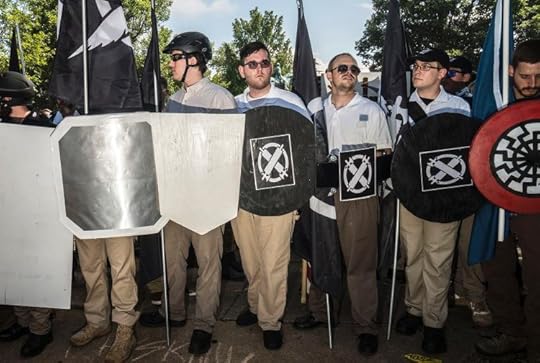
Neo-Nazis during the “Unite the Right” march in Charlottesville on 12 August 2017. A man in the centre is James Fields who killed one and injured 19 counter-protestors.
The second problematic aspect is that the perspective on right-wing extremism adopted in the bill is too American. While it may appropriately reflect the realities in the US, it is likely to fail to do so in the broader Western context, which is crucial since the act is about foreign, rather than American, organizations. Two points here. First, the term “white supremacism” implies the indisputability of the concept of white race, which is not the case in many Western countries, while far-right hate crimes may be underpinned by ethnic or national, rather than racial, considerations. Second, if we are talking about “unlawful acts of force or violence” informed by “a belief in the intellectual and moral superiority of the white race over other races”, then we leave out a great number of dangerous right-wing extremist organizations that may engage in acts of terrorism not against perceived “non-white” people, but against political opponents (liberal or left-wing politicians or activists), as well as against the LGBT community. Hence, it would perhaps be useful to refer not to “white supremacist extremist organizations”, but to “right-wing extremist organizations”.
The third potentially problematic aspect is connected to the implementation of the bill. What right-wing extremist organizations can be designated as FTOs? A number of texts (co-)written by Congressman Max Rose as part of his argument in favor of the Transnational White Supremacist Extremism Review Act produce a controversial picture. For example, Rose’s letter to the Secretary of State Michael Pompeo (signed, in addition, by other 39 Members of Congress) and the New York Times op-ed (co-authored by Rose and former Federal Bureau of Investigation special agent Ali H. Soufan) correctly indicate some right-wing terrorist organizations, misidentify as such another organization, and miss some obvious cases.
The two texts are right to consider the British National Action and Scandinavian Nordic Resistance Movement (NRM) as terrorist organizations. National Action glorified the assassination of the UK’s MP Jo Cox by a British neo-Nazi and incited further violence against politicians. Several members of the NRM were engaged in a series of bombings and attempted bombings targeting left-wing activists and a refugee residence. A British neo-Nazi who murdered Jo Cox had links to the American far right, while two out of three NRM’s convicted bombers received explosive-ordnance training at a paramilitary camp organized by the RIM already designated as a SDGT.
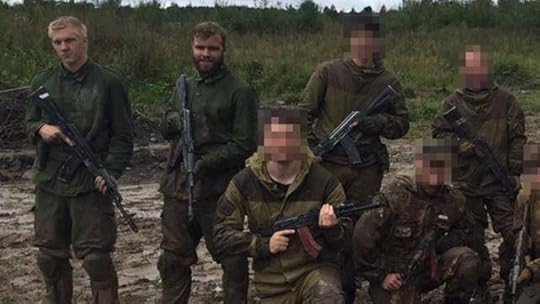
Swedish neo-Nazis from the Nordic Resistance movement Anton Thulin (first from the left) and Viktor Melin (second from the left) at the Partisan military camp organized by the RIM.
However, the two documents incorrectly identify as a suspected FTO the Ukrainian “Azov Battalion”, which is – rather than being a “paramilitary unit” or a “militia organization”, as the texts erroneously assume – is an official regiment of the Ukrainian National Guard that is part of Ukraine’s Ministry of Internal Affairs the orders of which the regiment follows.
At the same time, the documents do not mention the evidently terrorist Blood & Honour network or Combat 18 group. The two originated in the UK, but over the years had chapters established across the Western world. Numerous cases of right-wing terrorism and other forms of ideologically driven political violence were and still are associated with members of these movements. Canada listed both as terrorist entities in 2019, and Germany banned Combat 18 nationwide in the beginning of 2020. It is high time the US did the same.
Congressman Max Rose’s legislative initiative can become a serious contribution to the international fight against right-wing extremism that has become increasingly transnational. However, this initiative would benefit from elaboration of the concepts it uses, as well as further consideration of its potential targets.
April 2, 2020
British far-right activist “Tommy Robinson” in Moscow
On 22 February 2020, a conference titled “Power and Market” took place in St. Petersburg. It was named after the book by Murray Rothbard, one of the key American libertarian thinkers, and was co-organised by the St. Petersburg branch of the Libertarian Party of Russia (LPR) and the “Civil Society” movement. One of the speakers at the event was a British far-right activist Stephen Yaxley-Lennon (also known as Tommy Robinson), a former leader of the far-right English Defence League and a convicted criminal whose criminal record includes convictions for violence, financial and immigration frauds, drug possession, and contempt of court. His presentation at the conference was titled “The Rape of Britain” and focused on what he called “jihad rape gangs” referring to the groups of men convicted of sexual offences against girls in the UK. The presentation elicited a great round of applause from the Russian audience.
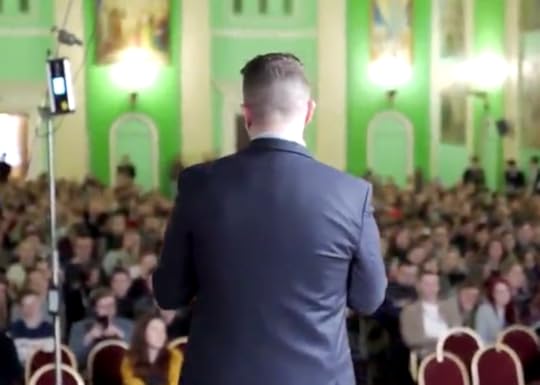
Stephen Yaxley-Lennon addressing the conference of the Libertarian Party of Russia in St. Petersburg.
The Russian individual who invited Yaxley-Lennon to Russia and to the conference was Mikhail Svetov, a prominent member of the LPR, the chair of the “Civil Society” movement and a popular blogger. Svetov also conducted a long interview with Yaxley-Lennon, in which the two activists exchanged their opinions about perceived ills in their societies. During the interview, when asked as to the reasons he came to Russia, Yaxley-Lennon replied that felt he was “silenced in the UK” and that he was seeking a platform in Russia. In 2019, he was banned from all major social networks including Facebook, Twitter, Instagram, YouTube and Snapchat. The only platform that still tolerates him today is Telegram developed by a Russian entrepreneur Pavel Durov and, ironically, blocked in Russia itself.
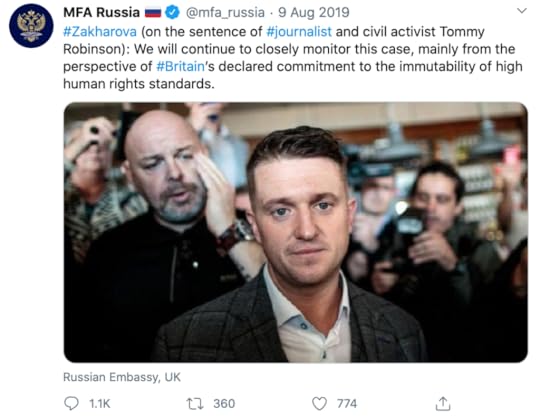
In August 2019, Maria Zakharova, Director of the Information and Press Department of Russia’s Ministry of Foreign Affairs, called Yaxley-Lennon a “journalist” and a “civil activist”.
But there was a good reason why Yaxley-Lennon talked about seeking a platform in Russia. Before he went to St. Petersburg to participate in the LPR’s event, he was in Moscow and gave interviews to several leading Russian media. Perhaps the main media event involving Yaxley-Lennon was his press conference at the most popular Russian tabloid Komsomol’skaya pravda (Komsomol Truth). The press conference – the announced theme of which was “What’s going on with free speech in Europe?” – was moderated by Alexander Malkevich who, in December 2018, was sanctioned by the US for his attempts to target Americans with online disinformation through the website USA Really linked to “Putin’s chef” Yevgeny Prigozhin, who is himself sanctioned by the US. At the press conference, Malkevich declared that Russian media were one of the last islands of freedom of speech in Europe and that Yaxley-Lennon’s “Rape of Britain” presentation – such as the one he did in the press centre of Komsomol’skaya pravda – was impossible to imagine in the UK.
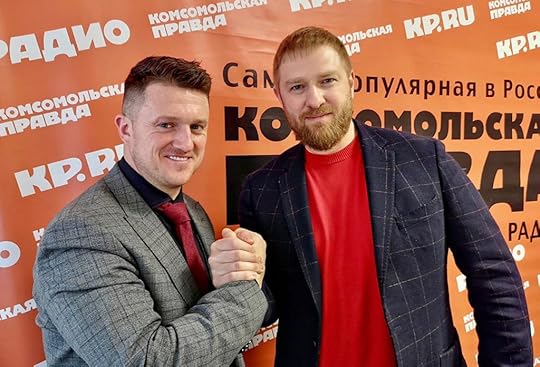
Yaxley-Lennon and Alexander Malkevich at the press conference of the Komsomol’skaya pravda.
Yaxley-Lennon did more interviews in Moscow: he was interviewed for Vechernyaya Moskva (Evening Moscow), the FAN website (linked to Prigozhin), Tsargrad TV (founded by the EU/US-sanctioned Russian businessman Konstantin Malofeev), and RT. With the exception of RT that interviewed Yaxley-Lennon exclusively about his “Rape of Britain” presentation, other interviews featured a set of recurring disinformation narratives: the US was supporting Islamist terrorists; Russia was unlikely behind the poisoning of the Skripals in the UK; Putin is a strong leader; the EU destabilised Ukraine, while Angela Merkel planned a NATO-led invasion of Ukraine. Asked by Tsargrad TV whether it made sense to unite Russian and European forces in “the fight for the preservation of identity”, Yaxley-Lennon replied that it was the only way “to protect Europe, our culture, [and] our identity”, and that Putin’s Russia was the key ally in the impending struggle.

Yaxley-Lennon’s visit to Russia is, to a certain extent, a typical story in the relations between Russian state and non-state actors and the European far right, and demonstrates what each side of this relationships wants from each other. Mikhail Svetov, a Russian non-state actor, invited Yaxley-Lennon to Russia in order to boost his own political popularity and promote his YouTube channel “SVTV” that featured the interview with the British far-right activist. Yaxley-Lennon went to Russia to propagate his ideas using Russian media as a platform that he was denied in his own country and internationally. Russian pro-Putin media used Yaxley-Lennon’s poor knowledge of Russian politics* in order to convey his views, which are consistent with, if not directly inspired by, the Kremlin’s propaganda and disinformation campaigns, to justify Moscow’s foreign policy and discredit Western liberalism both for the international and domestic audiences.
* During the interview with Svetov, Yaxley-Lennon admitted that he did “not know enough about the politics in Russia [or] about the history of Russia”.
This post is an extract from my article for the forthcoming publication of the Oxford Changing Character of War (CCW) Centre.
September 24, 2019
A quick glance at the far-right vote on the EP resolution on the importance of European remembrance for the future of Europe
On 19 September 2019, the European Parliament (EP) adopted a resolution on the importance of European remembrance for the future of Europe. This resolution, in particular, stressed that the Second World War had been “started as an immediate result of the notorious Nazi-Soviet Treaty on Non-Aggression of 23 August 1939”, recalled that “the Nazi and communist regimes [had] carried out mass murders, genocide and deportations, and [had] caused a loss of life and freedom in the 20th century on a scale unseen in human history”, and condemned “in the strongest terms the acts of aggression, crimes against humanity and mass human rights violations perpetrated by the Nazi, communist and other totalitarian regimes”.
535 MEPs voted for the resolution, 66 MEPs voted against it, and 52 MEPs abstained. (See the results of the vote here.) The only EP group that decided to vote against the resolution was the far-left group “European United Left/Nordic Green Left” (GUE-NGL) that predominantly consists of MEPs coming from West European countries that have no experience of the post-war Soviet occupation. Out of 41 members of the GUE-NGL group, only 5 MEPs come from the countries or territories (the case of former East Germany) that suffered the Soviet yoke.
The far-right “Identity and Democracy” group (ID) decided to support the resolution, but its vote turned out be the least cohesive in comparison to other EP groups: out of 73 members of the ID group, 16 MEPs abstained, namely members of the far-right parties such as Vlaams Belang (Belgium), EKRE (Estonia), Perussuomalaiset (Finland) and AfD (Germany). The abstention of the EKRE’s member, Jaak Madison, is perhaps the most curious: the EKRE positions itself as a party unfriendly towards Russia, therefore – taking into consideration that the Soviet Union annexed and occupied Estonia for several decades – one could expect that an Estonian ultranationalist would support the resolution that is critical of Russia’s justification of the Stalinist crimes, but that was not the case. Perhaps the explanation of Madison’s abstention lies elsewhere – possibly in the resolution’s strong words against fascism, which Madison considers “an ideology that consists of quite a few positive and necessary nuances to preserve the nation state”.
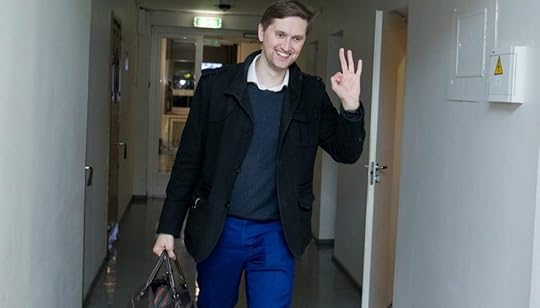
Jaak Madison (EKRE/ID group) showing an OK hand gesture that can be interpreted as a White Power sign in the far-right context
As for Russia, the resolution, indeed, addresses the problem of Moscow’s praise for the communist crimes in two paragraphs:
Maintains that Russia remains the greatest victim of communist totalitarianism and that its development into a democratic state will be impeded as long as the government, the political elite and political propaganda continue to whitewash communist crimes and glorify the Soviet totalitarian regime; calls, therefore, on Russian society to come to terms with its tragic past;
Is deeply concerned about the efforts of the current Russian leadership to distort historical facts and whitewash crimes committed by the Soviet totalitarian regime and considers them a dangerous component of the information war waged against democratic Europe that aims to divide Europe, and therefore calls on the Commission to decisively counteract these efforts.
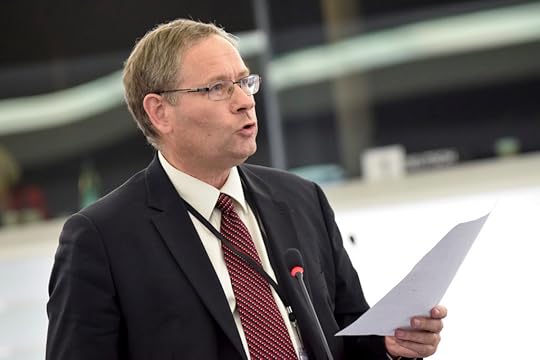
Gilles Lebreton, Rassemblement National/ID group
This did not go unnoticed for the ID group, as the majority of the parties represented by the ID’s MEPs are friendly towards Putin’s regime. During the debates on the resolution, a member of the French Rassemblement National (formerly known as the Front National) Gilles Lebreton spoke on behalf of the ID group and, while supporting the resolution in general, said – among other things – the following: “I warn the European Parliament against the temptation to use [the resolution] to attack today’s Russia. Russia has cut ties with the Soviet Union in 1991 and has become a respectable state that deserves to be treated as a partner rather than an enemy”. It remains a mystery what exactly makes Putin’s Russia, which glorifies the Soviet totalitarian regime and illegally occupies territories of Moldova, Georgia and Ukraine, a “respectable state”.
February 27, 2019
Ukraine fecklessly irritates OSCE, but fails to identify genuine security threats related to election observation
On 2 January 2019, Ukraine’s Foreign Minister Pavlo Klimkin wrote a letter to Ingibjörg Sólrún Gísladóttir, director of the OSCE Office for Democratic Institutions and Human Rights (ODIHR), in which he invited ODIHR observers to monitor the presidential elections in Ukraine planned for 31 March 2019. In the same letter, Klimkin informed Gísladóttir that Ukraine recognised the Russian Federation “as an aggressor state and an occupying power” and said that Ukraine’s Foreign Ministry would not “accept applications for accreditation as official observers from foreign states or international organizations from the holders of Russian passports or other individuals seconded by the Russian side”.
On 23 January 2019, the Central Election Commission (CEC) of Ukraine issued a statement in which – referring to the need of “minimizing the risks and threats of the Russian intervention [sic] in the upcoming presidential elections on March 31, 2019” – it reminded “all foreign states and international organizations intending to monitor the electoral process” that the Russian Federation was recognised by Ukraine as “an aggressor state, committing a crime of aggression against Ukraine and temporarily occupying parts of its territory”.
Several days later, on 4 February, a draft law was submitted to the Ukrainian parliament that barred Russians from observing Ukrainian elections. The new law modified the existing laws on Ukrainian elections and said that citizens of an aggressor state or individuals nominated by an aggressor state could not serve as official observers representing foreign states or international organisations. The Ukrainian parliament adopted this law on 6 February, and President Petro Poroshenko inked it on 26 February.
The law drew criticism of the OSCE Office for Democratic Institutions and Human Rights (ODIHR) that traditionally sends the largest international observation missions to Ukraine. As Russia is a member of the OSCE, it has a right to send Russian citizens to the ODIHR missions and it proposed to include two Russian citizens as long-term observers to monitor the presidential elections in Ukraine.
Ambassador Peter Tejler, the head of the ODIHR observation mission to Ukraine, said that Ukraine’s intention to bar Russian observers from monitoring the presidential elections ran counter to the country’s commitments to the OSCE and was against OSCE principles.
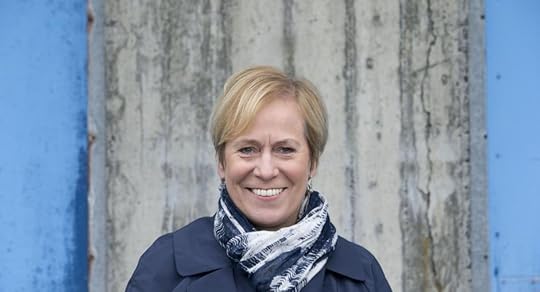
Ingibjörg Sólrún Gísladóttir, director of the OSCE Office for Democratic Institutions and Human Rights
Gísladóttir wrote a letter to Ukraine’s Ministry of Foreign Affairs and expressed her regret over the decision to block Russian citizens from taking part in the ODIHR election observation mission. In particular, she said: “The decision to deny the possibility of accreditation to citizens of one participating State is without precedent and contravenes commitments made by all participating States to invite observers from any other OSCE participating States that may wish to observe election proceedings to the extent permitted by law”.
Criticism of Ukraine’s move came also from other influential figures. Miroslav Lajčák, Slovak Minister of Foreign and European Affairs and Chairperson-in-Office of the OSCE, “expressed his deep regret” about the law and “called upon the Ukrainian authorities to continue to explore all possible avenues for a solution that would allow all ODIHR observers to become accredited for these elections”.
Kurt Volker, U.S. Special Representative for Ukraine wrote in his Twitter:
Ukraine needs ODIHR monitors to prove it adhers to democratic standards. Otherwise allows people to question election. OK if Russian monitors are part — but under ODIHR authority. No games.
needs to have confidence in its own democratic institutions.
— Kurt Volker (@SpecRepUkraine) February 7, 2019
The Ukrainian authorities justified the decision to bar Russian citizens from observing the elections either citing security concerns or playing a moral card saying that it would be unsavoury to invite citizens of an aggressor state to monitor elections in the country which is a victim of the aggression. While Russia’s aggression, which started from the occupation of Crimea in February 2014, is undeniable, banning Russian observers has no security dimension, especially in relation to ODIHR observers. As Gísladóttir explained, ODIHR monitors “do not represent their respective countries, but rather the entire OSCE. They are obliged to follow ODIHR’s election observation methodology and are bound by the Office’s strict code of conduct for election observers, including remaining strictly impartial and not intervening in the election process in any way”. In other words, ODIHR’s methodology excludes a possibility for individual observers to interfere in the electoral process. In this sense, by banning Russian citizens from observing Ukrainian elections for political reasons, Ukraine effectively cast doubt on the methodology of the OSCE, which Ukraine has been a member of since 1992.
Moreover, ODIHR missions including Russian observers monitored Ukrainian presidential and parliamentary elections in 2014 and regional elections in 2015, i.e. during the Russian-Ukrainian war, and the country did not have any problem with Russian observers. Russian citizens also took part, in 2014 and 2015, in the monitoring missions organised by the European Platform for Democratic Elections, and, again, no problem was registered with the Russian members.
The only genuine reason for banning Russian observers seems to be Ukraine’s willingness to settle scores with the OSCE. Ukraine is legitimately aggrieved by the fact that the OSCE includes Russian citizens in its Special Monitoring Mission (SMM) that has been deployed to Ukraine since 2014 “to observe and report in an impartial and objective way on the situation” in the country and “to facilitate dialogue among all parties to the crisis”. Ukraine’s grievance is undoubtedly justified at least for two main reasons: (1) Russia is party to the conflict, and (2) there are well-founded suspicions that Moscow has been sending agents and spies to the OSCE SMM under the guise of regular observers. However, these problems cannot warrant the decision to bar Russian observers from monitoring the elections, because – to reiterate – ODIHR’s election observation methodology does not allow for political interference in the elections.
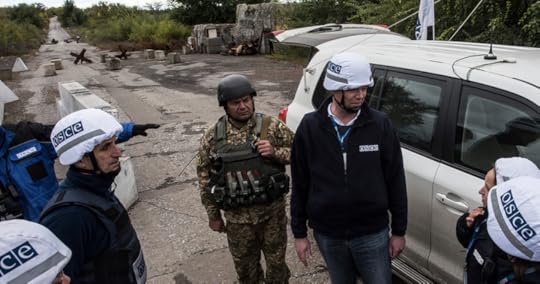
OSCE SMM patrolling in eastern Ukraine near Zolote/Pervomaisk area in September 2016 (OSCE/Evgeniy Maloletka)
At the same time, the Ukrainian authorities give free rein to politically biased international observation which does constitute a security threat but is routinely ignored by Ukraine’s CEC, Foreign Ministry and security services.
A mission of the European Centre for Geopolitical Analysis (ECGA) observed the early presidential elections in 2014. The ECGA was founded by Mateusz Piskorski, a Polish pro-Kremlin activist who has been under arrest in Poland since 2016 on suspicion of spying for Russia.
In 2014, a mission of the International Expert Center for Electoral Systems (ICES) led by Alexander Tsinker monitored the early parliamentary elections. Although the ICES has official credentials of an election observation organisation, its activities are aimed at approving electoral results of pro-Russian political forces in Ukraine and elsewhere. In 2012, the Georgian CEC rejected the ICES’s application for accreditation as election observers because of non-transparency of sources of funding of the ICES.
In 2015, a mission of the International Civil Organisation “Political Initiative” observed the Ukrainian regional elections. The mission was headed by Sergejs Blagoveščenskis, the self-proclaimed defender of the Russian language in Latvia and supporter of pro-Russian parties in that country. The mission also featured, among others, Stanislav Berkovec from the Czech ANO 2011 political party who observed the illegitimate referendum in Crimea in 2014, and members of far-right parties Alternative for Germany and Hungarian Jobbik that were known for their pro-Moscow foreign policy positions. During its activities in Ukraine, the mission of the “Political Initiative” was working in favour of the Opposition Bloc – a successor to the now defunct pro-Russian Party of Regions.
This year, the CEC granted accreditation to the ICES’s mission again. It features nine people:
1. Alexander Tsinker.
2. Natan Cohen.
3. Anna Čurdová.
4. Dariusz Cychol.
5. Johan Deckmyn.
6. Zita Gurmai.
7. László Kemény.
8. Nikolai Meinert.
9. Vilmos Szabó.
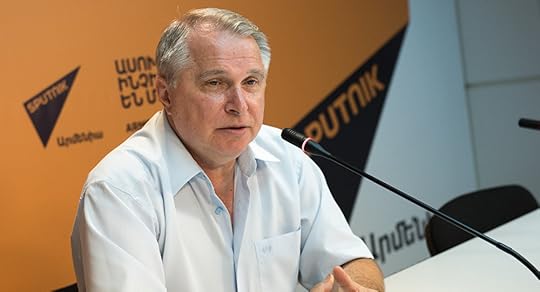
Alexander Tsinker, the head of the ICES mission
Biographies of several people on this list imply that these observers are far from impartial.
Dariusz Cychol is a regular author for the Polish edition of Sputnik, the Russian state-controlled international news website that promote Russian foreign policy interests.
Anna Čurdová is a member of the Party of Civic Rights founded in 2009 by current President of the Czech Republic Miloš Zeman who is known for his xenophobic and openly pro-Russian views. In 2015, she took part in the observation mission organised by the above-mentioned “Political Initiative” that provided “election observation” service for the pro-Russian Opposition Bloc.
Johan Deckmyn is a member of the Belgian far-right Flemish Interest party. Several of its members observed the illegitimate referendum in Crimea and so-called parliamentary elections in the Russia-occupied areas of Donbass.
Nikolai Meinert and László Kemény participated in an event co-organised by Alexander Tsinker’s ICES and structures close to the “Party of Regions”. The same event hosted above-mentioned pro-Kremlin activist Mateusz Piskorski.
As we see, the actions of the Ukrainian authorities are irrational in strategic terms. On the one hand, by fecklessly barring Russian citizens from observing elections in the country as part of the ODIHR and other respectable missions, they upset relations with the OSCE ODIHR that may cancel its mission to Ukraine altogether thus casting doubts on the fairness and transparency of the Ukrainian elections. On the other hand, the Ukrainian authorities accredit politically biased international observation missions whose only purpose is to provide partisan support to pro-Moscow political forces taking part in the Ukrainian elections.
December 12, 2018
French Yellow Vests, the Far Right, and the “Russian connection”
The Movement of the Yellow Vests (“Gilets Jaunes” in French) was started in the mid-November 2018 as a popular protest against an increase of fuel taxes underpinned by the environmental concerns. The protesters chose to wear high-visibility vests: since 2008, all drivers are required to have these vests in their vehicles. On 17 November, the protests mobilised, according to the Interior Ministry, 282,000 demonstrators throughout France, on 24 November – 106,000 people, on 1 December – 75,000 people, and on 8 December – 136,000 people. At the end of November, public opinion polls showed that the protests were supported by 84% of the French.
Organised in a horizontal and leaderless manner, the Gilets Jaunes protests were extremely heterogeneous, with demonstrators representing the entire political spectrum, from the far left to the far right. This was reflected by the social support for the movement from the majority of sympathisers of all major French parties. 92% of the sympathisers of the far-left “Insubordinate France” found the protests justified or somewhat justified; the same was said by the 90% of the Socialist Party sympathisers, 77% of the Republicans sympathisers, and 96% of the sympathisers of the far-right National Rally. Interestingly, every second sympathiser of the “Republic on the Move!”, the party of President Emmanuel Macron, i.e. the main target of the protests, thought that the protests were justified or somewhat justified.
However, the protests remained largely anti-political: demonstrators refused to be represented by political parties and often frowned upon politicians who wanted to merge with the Gilets Jaunes. Moreover, when leaders of more moderate groups of the Gilets Jaunes agreed to negotiate the planned anti-pollution fuel taxes with the authorities, they were threatened by some other groups in the movement and had to withdraw from negotiations.
The pro-government media highlighted – in a predominantly imbalanced manner – the presence of the ideologically fringe elements at the demonstrations and slammed the protesters as racists, homophobes, beaufs, slackers and illiterates. In other words, the pro-government media pulled the Hillary Clinton stunt and called the Gilets Jaunes movement “a basket of deplorables”.
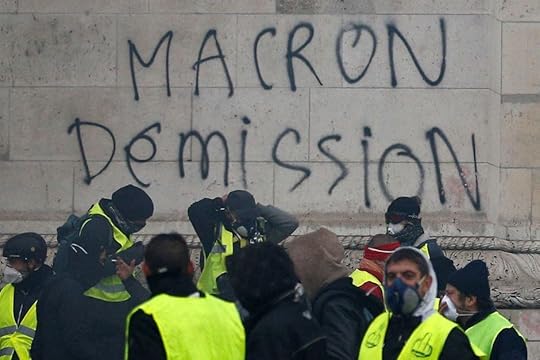
Credit: Reuters/Stephane Mahe
Within two weeks after the start of the protests, as violence on the part of some groups inside the Gilets Jaunes movement and police spiraled, the demonstrations radicalised and started transforming into something more dramatic. When French Prime Minister Édouard Philippe said on 4 December that the planned fuel tax would be put on hold, the Gilets Jaunes protests did not stop. It was no longer the fuel taxes that angered the demonstrators, but rather the ruling political class in general and Macron’s presidency in particular. “Macron demission” (resignation of Macron) became the main slogan of the Gilets Jaunes movement.
The Kremlin ‘s political agenda in Russia and abroad
As it often happens with major social upheavals, foreign actors hurried to exploit the protests aiming to further their own political agendas. Turkish President Recep Tayyip Erdoğan, who is frequently criticised by European leaders for the authoritarian and illiberal trends in Turkey, commented on the developments in France by denouncing the “disproportionate violence” of the French authorities and declaring that Europe had “failed the exam of democracy, human rights and freedoms”. US President Donald Trump, who is infamous for denying climate change, tweeted that the people were protesting and rioting in France allegedly because they did not “want to pay large sums of money, much to third world countries (that are questionably run), in order to maybe protect the environment”.
Russian pro-Kremlin actors presented two interpretations of the Gilets Jaunes movement: one interpretation was aimed at the domestic audience, the other targeted the international one.
The Russian domestic interpretation was arguably best articulated by Dmitry Kiselyov, the head of the Russian Federal State News Agency “Rossiya Segodnya” (Russia Today, not to be confused with RT): the French protests were orchestrated by the US, in the same manner that it orchestrated “colour revolutions” in Georgia, Ukraine and the Arab world. In one of his TV programmes, Kiselyov, who was sanctioned by the majority of European nations in 2014 for his war-mongering efforts, alleged that Americans instigated the French against Macron because they wanted to unseat him for promoting the idea of the European Army that is seen by Moscow as an alternative to, if not competitor of, NATO, which, in Putin’s eyes, is the main instrument of the American influence. This interpretation reflected the Kremlin’s visceral fear of a regime change, and, by focusing on the violent actions of the Gilets Jaunes and the chaos they brought to the streets of Paris, as well as virtually justifying the police repressions against the demonstrators, the Russian state-controlled TV simply continued discouraging the Russian society from protesting against the authorities.
The Russian interpretation of the Gilets Jaunes aimed at the international audience was strikingly different: Russian state-controlled media operating in several European languages encouraged the protests in France. Right-wing media such as RT and Sputnik pictured the Gilets Jaunes movement as a protest against Macron’s liberal politics (implicitly suggesting that the protests should be supported), while the left-leaning Redfish trumpeted police brutality with an objective to wind the audience up against the French capitalist leadership. To add fuel to the fire, Russia’s international media also employed their usual disinformation techniques. For example, they promoted the declarations from two marginal police trade unions that supported the Gilets Janues to create an impression that the French police in general was siding with the protest movement.
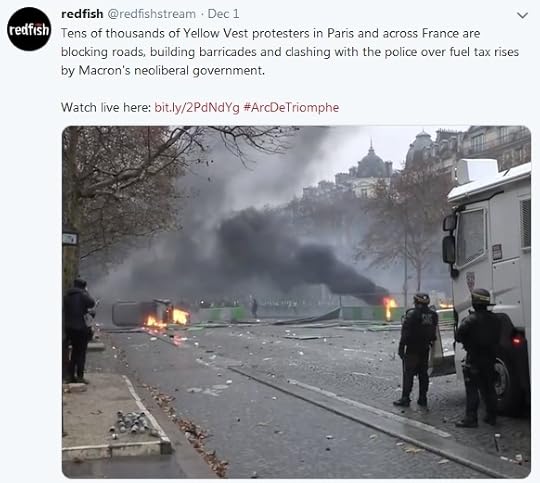
Russian Resfish website slams “Macron’s neoliberal government” and police brutality
Perhaps unsurprisingly, it was this particular narrative that apparently became the most popular message among hundreds of pro-Kremlin Twitter accounts (that may or may not be operated by Russian actors), according to the research conducted by the Alliance for Securing Democracy, a unit of the German Marshall Fund of the US. Following these reports, French Foreign Minister Jean-Yves Le Drian said on 9 December that they started an official inquiry into possible Russian interference behind the Gilets Jaunes movement. The Kremlin quickly responded to these developments: on 10 December, Putin’s press secretary Dmitry Peskov dismissed the charges by saying that any allegation “of Russia’s possible involvement [in the French protests] was nothing but slander”.
The far-right link
The anti-political nature of the Gilets Jaunes effectively ruled out the possibility of major politicians openly joining the protests, even if those politicians supported the demonstrators and even if significant parts of the Gilets Jaunes movement voted for them in the presidential or parliamentary elections in 2017. However, this exclusionary approach did not apply to minor activists, representing, among others, far-right movements and organisations. One organisation that was especially visible during the protests was the Action Française (French Action) – their visibility sometimes triggered attacks from far-left activists. The protests attracted even foreign far-right activists, for example members of the Italian fascist party CasaPound.
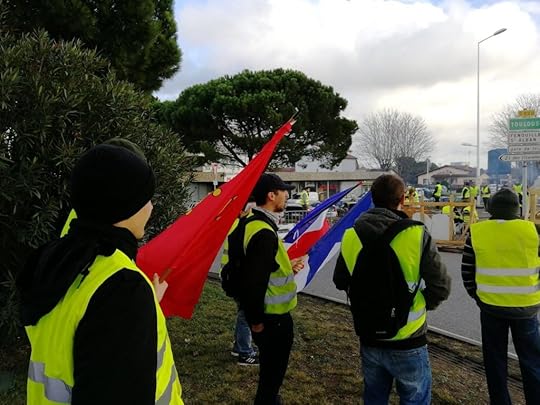
Activists of the Action Française at the Gilets Jaunes protests in Toulouse
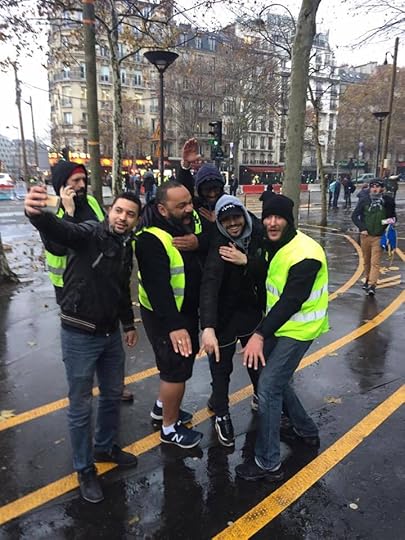
French anti-Semitic comedian Dieudonné (centre) and his supporters enjoying themselves at the demonstration
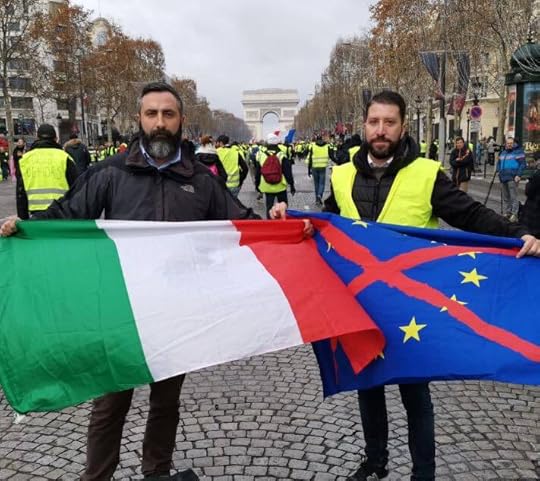
CasaPound’s Davide Di Stefano and Luca Marsella at the protests in Paris
Among the far-right activists present at the Gilets Jaunes demonstrations, there was a small group of people who were known, in particular, for their Russian contacts: Xavier Moreau, Fabrice Sorlin, André Chanclu and Emmanuel Leroy.
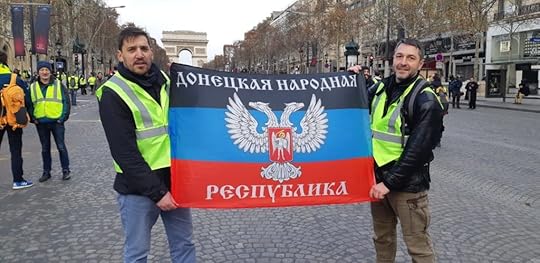
Fabrice Sorlin (left) and Xavier Moreau (right) holding a flag of the so-called “Donetsk People’s Republic”
Xavier Moreau is a former paratrooper officer who holds dual French-Russian citizenship and owns the Moscow-based Sokol Holding that provides consultancy and security to French companies. According to Bruno Gollnisch, a prominent member of the far-right National Front (renamed into the National Rally in 2018), Moreau contributed to establishing the relations between the National Front and Russian actors. In November 2018, Moreau “observed” the illegitimate “parliamentary elections” in Russia-occupied Eastern Ukraine.
Fabrice Sorlin is the leader of the French Catholic ultranationalist organisation “Day of Wrath” and former candidate for the National Front. In 2009, he formed a small pro-Kremlin organisation, the Europe-Russia Alliance that was later renamed into the Association France-Europe-Russia Alliance.
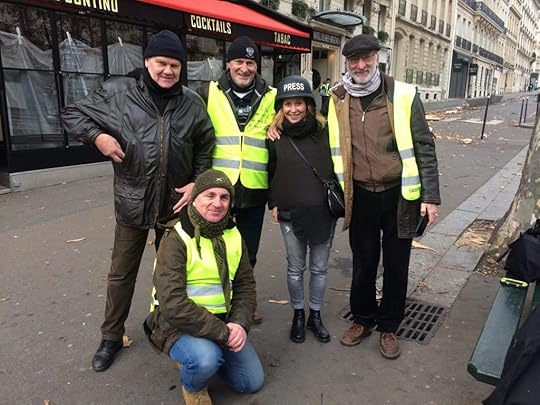
(top row, left to right) unknown man, André Chanclu, Alexandra Lusnikova (Russian newspaper Izvestiya), Emmanuel Leroy. Bottom: Vincent Perfetti
André Chanclu is a former member of the violent extreme-right Defence Union Group (better known as GUD). In late 2008, Chanclu founded two small pro-Kremlin organisations, France-Russia Collective and Novopole.
Emmanuel Leroy is a former member of the New Right Research and Study Group for European Civilisation (better known as GRECE) and member of Sorlin’s Association France-Europe-Russia Alliance. According to French journalist Gaïdz Minassian, Leroy is married to a Russian wife who has been close to the Russian Embassy in Paris.
The four French pro-Kremlin far-right activists have also been in contact with Russian fascist Aleksandr Dugin, the leader of the International Eurasian Movement. Dugin was once a professor at the Moscow State University but lost his job in 2014 after his hateful comments against the Ukrainian people. He was also the editor of two media projects, Katehon website and Tsargrad TV, founded by Russian ultranationalist businessman Konstantin Malofeev, but was dismissed from both positions in the beginning of 2017. As his French contacts in the social networks widely supported the Gilets Jaunes, Dugin himself enthusiastically approved of the protests and actively posted extreme-right interpretations of the demonstrations.

After the publication on the social networks of the picture of Moreau and Sorlin holding the flag of the Donetsk People’s Republic at one of the demonstrations of the Gilets Jaunes, the Security Services of Ukraine started disseminating a conspiracy theory – essentially based on one single picture – suggesting that the Federal Security Service of Russia and Directorate of General Staff of the Russian Army organised “riots and acts of violence in France”. Moreover, the Ukraine’s security services alleged that Russian intelligence services would organise “similar provocations in Belgium, Germany, Spain, Bulgaria and other European countries”. While lacking evidence and factual basis behind it, the Ukrainian conspiracy theory about Russia orchestrating the violent activities of the Gilets Jaunes movement resonated with some anti-Russian circles.
Conclusion
The Gilets Jaunes are a very broad protest movement that cuts across all French political camps. While maintaining the generally anti-political character and refusing platform to major politicians, the Gilets Jaunes are nevertheless joined by minor activists from various political movements and organisations, including the far right who play a visible and often divisive role in the anti-government protests.
The Gilets Jaunes are also being instrumentalised by foreign powers, including the US, Turkey and, most notably, Russia that are trying to exploit the protests to push forward their own political agendas and discredit European liberal democracy. Nevertheless, and despite the fact that the Gilets Jaunes feature a few far-right activists who have been involved in various pro-Kremlin efforts and maintain contacts with their Russian counterparts, there is no evidence that official Moscow has played any role in orchestrating the protest movement.
June 26, 2018
Belarus tries to follow in Moscow’s steps and team up with the European far right
On 21 May 2018, Belarusian far-right politician Oleh Haidukevich published on his Facebook a message that said that his party, the misleadingly named Liberal Democratic Party of Belarus (LDPB) led by his father Siarhei Haidukevich, started preparations for the “Congress of Patriotic Parties in Europe” that would take place in Minsk, the capital of Belarus.
In his post, Haidukevich mentioned that the LDPB had invited representatives of the Freedom Party of Austria (FPÖ), French National Front (FN, renamed into the National Rally on 1 June 2018), Alternative for Germany (AfD), “United Russia” and 15 unnamed parties. He also posted two scanned copies of invitations addressed to FN’s president Marine Le Pen and the FPÖ’s leader Heinz-Christian Strache. The invitations were dated 26 April 2018 and said that the congress would discuss “patriotism, conservatism, national conservatism and social-conservatism”, “the right [sic!] renaissance”, “perspectives of identity and traditional values”, preservation of “national traditions and mentality [sic!]”, “the problem of Islamic fundamentalism”, “the crisis of the European Union and NATO”, European and Russian (counter-)sanctions, “the idea of the Greater North from Antwerp to Vladivostok”, “the Great North as a single civilizational and cultural space of great Europe”, “the crisis of the family and family values” and “alternative media self-organization and promotion experience”, among other topics.
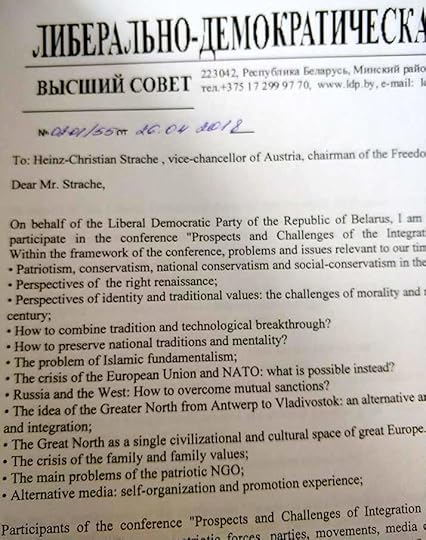
A copy of the letter addressed to the FPÖ’s leader HC Strache and posted by the LDPB’s Oleh Haidukevich
The posted copies of the invitations did not mention the date of the planned congress, but some media reports say that the congress can take place in the second half of 2018. However, it is not the first time that the LDPB is trying to organise a far-right conference in Belarus. Like its Russian sister party, the misleadingly named Liberal Democratic Party of Russia (LDPR) led by Vladimir Zhirinovsky, the LDBP has been obsessed with an idea of inviting European far-right politicians to Minsk for quite some time. On 28 October 2014, a day after the leadership of the LDPB met with the delegation of the FPÖ in Minsk, Oleh Haidukevich said that they were going to hold a conference of “right-wing parties” soon, but no event seemed to have taken place. On 5 April 2016, as Oleh Haidukevich was meeting with Italian fascist Roberto Fiore, as well as Latvian far-left politician Normunds Grostiņš and Polish right-wing activist Sławomir Ozdyk, the LDPB said that it would hold the “patriotic congress” in Minsk after the parliamentary elections in Belarus. The elections were held on 11 September 2016, but no congress took place afterwards.
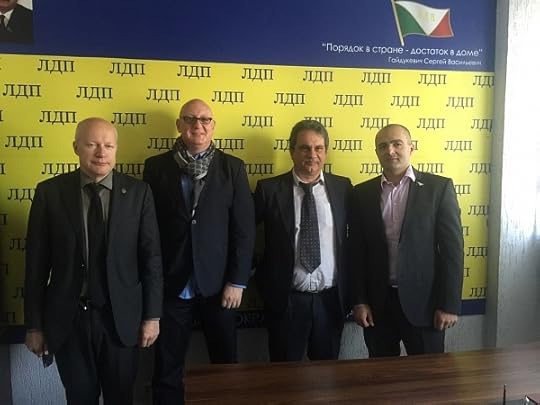
(left to right) Normunds Grostiņš, Sławomir Ozdyk, Roberto Fiore, and the LPDB’s Oleh Haidukevich meeting in Minsk, 5 April 2016
The LDPB claims to have contacts with a number of the European far-right parties. According to Oleh Haidukevich, the LDPB cooperates with approximately 30 parties and signed agreements on cooperation with the FN, FPÖ and Italian Social Movement – Tricolour Flame led by Attilio Carelli. After the 2016 parliamentary elections, in which Siarhei Haidukevich won a seat in the Belarusian parliament, the LDPB claimed that it received compliments from the FN, AfD and FPÖ. The LDPB’s contacts with the Austrian far-right party seems to be especially active: on 30 March 2017, Siarhei Haidukevich visited Vienna upon the invitation from the FPÖ and met with Johann Gudenus and Johannes Hübner. According to the LDPB, Siarhei Haidukevich discussed “specific issues of inter-parliamentary, cross-party and interstate cooperation” with the representatives of the FPÖ. After the parliamentary elections in Germany, the LDPB’s leader sent his compliments to the Christian Democratic Union of Germany and AfD, and also invited representatives of the AfD to visit Belarus.
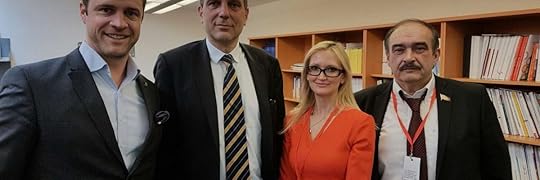
(left to right) Johann Gudenus, Johannes Hübner, unknown woman and the LDPB’s leader Siarhei Haidukevich meeting in Vienna, 30 March 2017
The LDPB holds a special place in the Belarusian authoritarian system. According to Andrew Wilson, the LDPB is a fake opposition party, the purpose of which is to side-line the real opposition. In his book Belarus: The Last European Dictatorship, Wilson writes:
“The [Liberal Democratic Party of Belarus] was named after its Russian equivalent, led by Vladimir Zhirinovskii, and [Siarhei] Haidukevich’s allotted role was similar to that of the notorious Russian provocateur. Haidukevich was prominent on Belarusian TV, constantly making over-the-top comments that distracted attention from the real opposition. […] Like Zhirinovskii, Haidukevich was far from serving up a plague on all houses and spent most of his time, as he was instructed, attacking [Belarusian President Aliaksandr] Lukashenka’s opponents, […] with one of his attacks, only days before the election, featuring suspiciously prominently in the state media.”
Among the experts on Belarus, there is also an understanding that Siarhei Haidukevich’s LDPB is a party, through which the regime is doing things it does not want to be associated with. One especially notorious instance of the LDPB’s doing the regime’s dirty work goes back to 2001-2002 and is related to the LDPB helping Saddam Hussein’s regime to circumvent the international sanctions against Iraq.
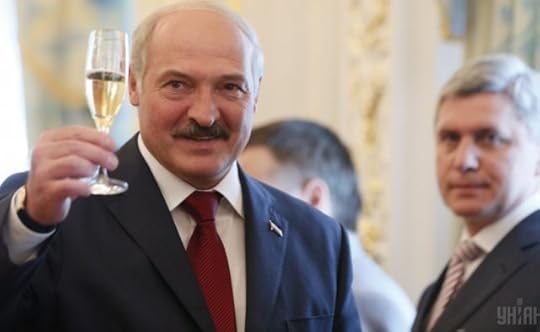
Belarusian President Aliaksandr Lukashenka
In 2005, a Belarusian newspaper published a photocopy of the letter from the Iraqi authorities addressed to the LDPB. The letter, presumably, read: “We are still waiting for your actions to meet your commitments in accordance with the above-mentioned contract. We solicit that you return to us the amount of USD 996,798.060 that you owe us”. Haidukevich sued the newspaper and eventually won the case. However, during the court proceedings, more details about the contract emerged. During one of the proceedings, the former deputy head of the LDPB Aliaksandr Rabotay claimed that the LDPB fulfilled the contract on 2 million barrels of Iraqi oil by having formalised and sold it. According to Rabotay, the “kickback” was 30% and it had to be returned back to Iraq, but the money was not sent. Rabotay had a warrant signed by Haidukevich personally that allowed him to do business with the Iraqi authorities on behalf of the LDPB.
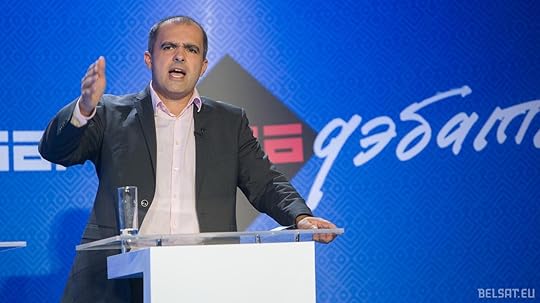
Oleh Haidukevich
At the end of 2005, after Haidukevich sued the newspaper, an anonymous group that presented themselves as Belarusian intelligence and security officers published a letter that provided further details into the LDPB’s dealings with Hussein’s regime. With a reference to the publication in question, the group said the money that the LDPB owed Iraq “was most likely resting in one of the Austrian banks, where the daughter of [Siarhei Haidukevich] lived in the city of Klagenfurt […]. Probably she was the manager of the Austrian accounts, into which S.V. Haidukevich supposedly deposited USD 1.5 million”. The letter continued:
“According to the information provided by our sources from the law-enforcement agencies, S.V. Haidukevich has long been working with the [Belarusian] Presidential Administration as to profiting from the deals with Hussein’s regime. The official Minsk did not work directly in this field, so S.V. Haidukevich was allotted a central role in this scheme. The transactions were carried out via the infamous Infobank that was blacklisted [by the US] for its activities related to the laundering of money received from the oil trade deals between the regimes of Lukashenka and Hussein. S.V. Haidukevich’s wife, Maria Haidukevich, works in this bank.”
(For further details about the Infobank’s role in circumventing the sanctions imposed on Hussein’s regime see the Duelfer Report.)
More information on these presumed deals is provided by the notorious WikiLeaks. One of the leaked US diplomatic cables dated 9 June 2006, in particular, reads:
“[Independent analyst Vladimir] Podgol went into greater detail about Gaidukevich’s oil-for-food schemes […]. Gaidukevich reportedly cheated dozens of people out of their share of the money, including from his LDPB deputies. One of those who he stole from is Russian oil man Vladimir Grigorivich Stepanov […].”
The leaked diplomatic cable suggested that Haidukevich was close to President Lukashenka and that Haidukevich might have also been involved in other corruption schemes:
“During [the 2006 presidential election], Lukashenko and his cabinet were angry with Gaidukevich for his laziness and failure to steal the desirable number of votes from the opposition. But now Gaidukevich is one of the most protected and untouchable men in Belarus. According to another Podgol source, the Presidential Administration forbade security services from investigating, following, or conducting surveillance on Gaidukevich. Therefore, Podgol suspects Gaidukevich is laundering Viktor [Lukashenka’s] weapons-trade money through channels in Europe, particularly through his daughter, Anya, who is a “student” living and studying in Austria.”
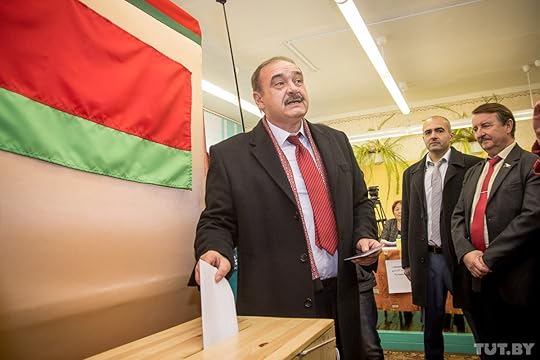
Siarhei Haidukevich
Now, it is important to note two interesting facts:
First, the Austrian city of Klagenfurt, where Anna (or Anya) Haidukevich lived according to the anonymous Belarusian group, is the capital of the federal state of Carinthia. From 1999-2008, the governor of Carinthia was Jörg Haider, the leader of the FPÖ and, later, the right-wing Alliance for the Future of Austria. Haider was involved in the deals with Hussein’s regime too. As I write in my book, Russia and the Western Far Right,
“Haider travelled to Baghdad three times in 2002. He actively remonstrated against Washington’s sanctions against Baghdad and apparently organised humanitarian medical aid to Iraq, while another member of the FPÖ, Ewald Stadler, founded the Austrian-Iraqi Society. Documents found in Baghdad after the demise of Hussein’s regime have revealed that Haider and Stadler, during their visit to Baghdad in May 2002, signed an agreement with the Iraqi authorities. According to that agreement, Haider and Stadler would act as Hussein’s lobbyists in Europe and receive $5 million for their services ($1,250,000 for Haider and $3,750,000 for Stadler).”
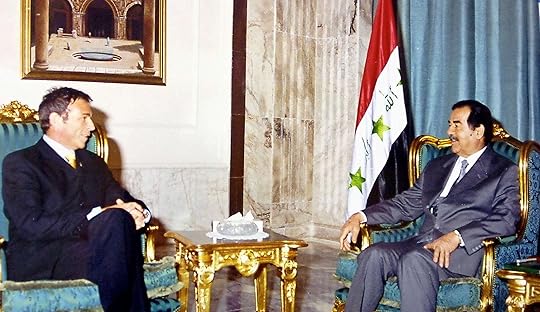
Jörg Haider (left), the leader of the far-right Freedom Party of Austria meets Iraqi dictator Saddam Hussein (right) in Baghdad, 12 February 2002.
Second, Zhirinovsky’s sister-party to the LDPB, i.e. LDPR, was also had dealings with Husseins’ regime. Quoting from the Duelfer report,
“According to Iraqi officials and Iraqi Ministry of Oil records, 73 million barrels were allocated in the name of Vladimir Zhirinovsky […].
According to Iraqi officials, Mr. Zhirinovsky received oil allocations because it was believed that he would advocate for political positions favorable to Iraq. […]
Throughout the sanctions period, Mr. Zhirinovsky opposed the sanctions regime and military actions against Iraq. Mr. Zhirinovsky was a frequent visitor to Baghdad and to the Iraqi Embassy in Moscow’. During his visits, Mr. Zhirinovsky often advocated for the interests of Russian companies in Iraq.”
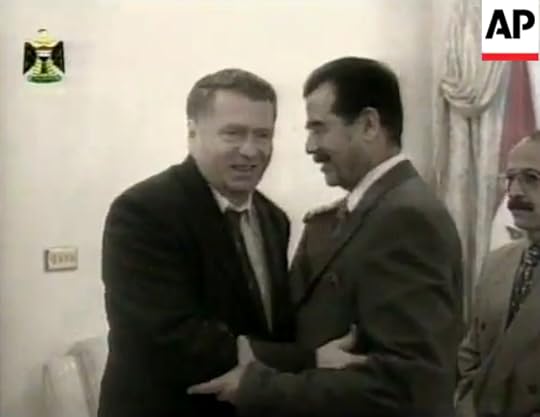
Vladimir Zhirinovsky (left) meets Iraqi dictator Saddam Hussein (right) in Baghdad, 29 December 1999.
But what does the LDPB have to do with the European far right today, especially the FPÖ, AfD and National Rally? All the three parties are known for their pro-Kremlin positions; in particular, they oppose the EU sanctions imposed on Putin’s Russia for the annexation of Crimea and invasion of Eastern Ukraine, as well as justifying Moscow’s foreign policies in Ukraine, Syria and elsewhere. Belarus is also sanctioned by the US and EU for its authoritarian practices; while many sanctions were lifted after 2015, some sanctions still remain in place. It is difficult to deny that, in the Belarusian authoritarian system, the LDPB can only operate with the permission from the Belarusian Presidential Administration, so it is most likely that the Presidential Administration gave the green light to the LDPB’s initiative. As the FPÖ and other far-right parties have been known for their criticism of the international sanctions against Hussein’s Iraq and, these days, against Putin’s Russia, Lukashenka’s regime may also benefit from the European far right calling for the lifting of the remaining sanctions against Belarus. If the “Congress of Patriotic Parties in Europe” indeed takes place, it will be interesting to see what narratives the European far right will promote afterwards.
June 20, 2018
Russian active measures, European neo-Nazis and the Kremlin’s French connection
On 7 June 2018, the Russian far-right, misleadingly named Liberal-Democratic Party of Russia (LDPR) led by Vladimir Zhirinovsky held a meeting called the “World Congress of Peace-loving Forces” (WCPF), which became yet another LDPR’s attempt to unite pro-Kremlin European far-right organisations.
The title “WCPF” is a reference to a conference held in Soviet Moscow under almost the same in 1973. That historical conference was a Soviet active measure aimed at promoting the allegedly peaceful image of the Soviet Union. It brought together over 3 thousand of left-wing activists and politicians from all over the world who praised the totalitarian Soviet regime for its struggle for the “preservation of peace”.

Like the Soviet conference in 1973, the LDPR’s 2018 event was about “world peace”. The announcement on the party’s website read:
Taking into account rising tensions in the international relations and destabilisation of the political situation in the world, underpinned by the following factors: disparities in the international financial and economic spheres, emergence of extremist and radical movements on the world scene, breakdown of the demographic balance, aggravation of nationalist, religious and other animosities affecting essential values of material and spiritual lives of the peoples of the world, the LDPR headed by Vladimir Zhirinovsky, convenes the World Congress of Peace-loving Forces.
The LDPR’s plan was gigantic: the party claimed that it invited representatives from “over 250 parties, over 100 organisations and movements, representatives of embassies, chambers of trade, commercial organisations, as well as various political scientists and media”. The aim was to “develop and strengthen contacts between parties” and form “a new model of social and political order”.
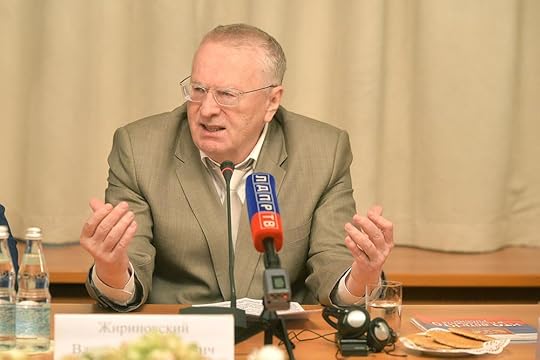
The LDPR’s leader Vladimir Zhirinovsky delivers an opening speech at the World Congress of Peace-loving Forces. Moscow, 7 June 2018.
A dedicated website of the congress said that the party had invited politicians from 55 countries and even named parties that the LDPR apparently asked to participate in the congress: Christian Democratic Union of Germany (Christlich Demokratische Union Deutschlands), Alternative for Germany (Alternative für Deutschland), Unity (Die Einheit, Germany), France Arise (Debout la France), National Front (Front national, France), Christian Democratic Appeal (Christen-Democratisch Appèl, Netherlands), Austrian People’s Party (Österreichische Volkspartei), Alliance (Porozumienie, Poland), Serbian Progressive Party, Fidesz (Hungary), Jobbik (Hungary), Brothers of Italy (Fratelli d’Italia), and Japanese Communist Party.
Unlike in 1973, the 2018 event turned out to be miniscule and there has been so far no evidence that any representative of the above-mentioned parties took part in the LDPR’s conference. However, more credible reports suggest that the conference largely hosted Russian and European fascists, i.e. representatives of the same “extremist and radical movements” that the LDPR was presumably concerned with. And perhaps not surprisingly, the dedicated website of the WCPF featured a symbol of the International Eurasian Movement led by Russian fascist Aleksandr Dugin.

The LDPR did not publicise either the names of the participants of the WCPF or names of the organisations they represented. However, the Russian neo-Nazi group “Slavic Unification and Revival” (SUR), which took part in the conference held in the building of the LDPR’s “Institute of World Civilisations”, was more informative. Thus, the SUR claimed that the WCPF hosted “representatives of various pro-Russian organisations from different countries” and “representatives of European national-patriotic forces”.
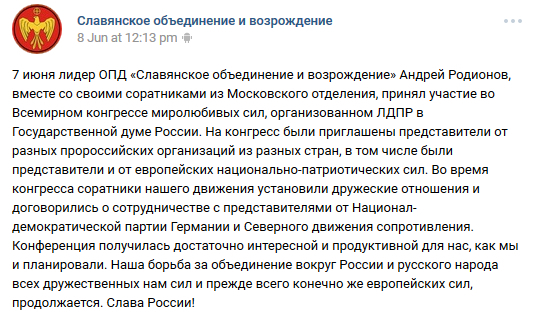
The SUR also stated that, during the conference, they “had established friendly relations with representatives of the National-Democratic Party of Germany [Nationaldemokratische Partei Deutschlands, NPD] and [the Danish chapter of the] Nordic Resistance Movement”. The NPD is a fascist party party, while the Nordic Resistance is a pan-Scandinavian neo-Nazi movement. In 2015, yet another Russian fascist organisation, Russian Imperial Movement, donated an unknown amount of money to the Swedish chapter of the Nordic Resistance.
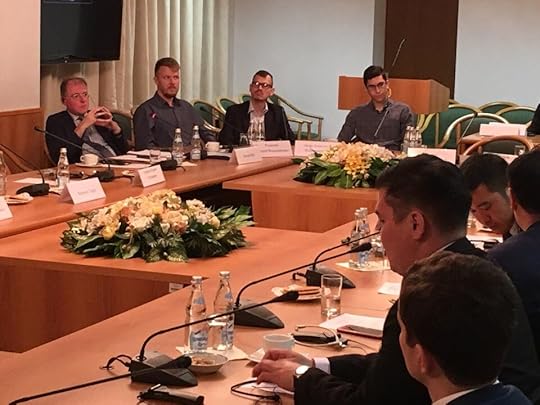
Representatives of the Russian, German and Danish neo-Nazi organisations at the World Congress of Peace-loving Forces. Moscow, 7 June 2018.
This is not the first time that the LDPR in general and Zhirinovsky in particular have tried to unite Russian and European far-right political forces. In 2003, Zhirinovsky convened – most likely using money from Saddam Hussein’s regime – the First World Congress of Patriotic Parties that hosted representatives of the French National Front, German People’s Union (Deutsche Volksunion), Japanese Issuikai, Hellenic Front (Ellinikó Métopo), Finnish Patriotic People’s Movement (Isänmaallinen Kansanliike) and Czech Republicans of Miroslav Sládek (Republikáni Miroslava Sládka). Three more World Congresses of Patriotic Parties were held by the LDPR in 2004, 2006 and 2010, but every next conference was more marginal than the previous ones, so the Congress died out. (See more details on this Congress and the LDPR’s connections to Hussein’s regime in my book Russia and the Western Far Right, pp. 54-59.)
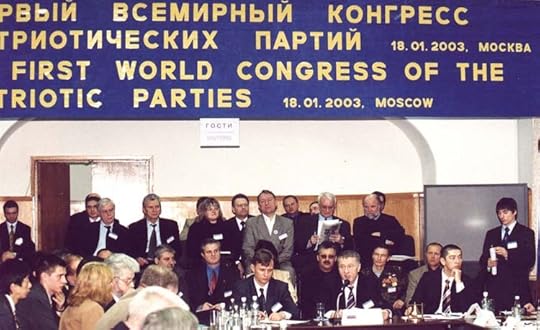
The First World Congress of Patriotic Parties organised by Vladimir Zhirinovsky to support Saddam Hussein took place in Moscow on 18 January 2003.
The WCPF essentially succeeded the First World Congress of Patriotic Parties, but it also inherited the latter’s failure: no politically significant party, even from the European far right scene, sent its representatives to the WCPF.
One curious exception is Thierry Mariani, member of the French centre-right Republicans (Les Républicains), former MP and current member of the French delegation to the Parliamentary Assembly of the Council of Europe (PACE). Mariani is well known in Russia and other authoritarian states: being a member of such respected institution such as the PACE, he has used his position to try to legitimise and justify non-democratic developments in Azerbaijan, Russia and Yanukovych’s Ukraine.
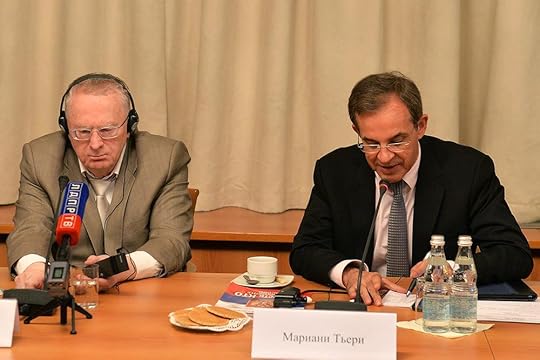
Vladimir Zhirinovsky (left) and Thierry Mariani (right) at the World Congress of Peace-loving Forces. Moscow, 7 June 2018.
Mariani is also the head of the openly pro-Kremlin French-Russian Dialogue Association, the members of which include Leonid Slutsky, a member of the LDPR who was recently accused of sexual harassment by several Russian female journalists. In April 2015, Slutsky, who is also the Chairman of the Committee on International Affairs of the Russian “parliament”, brought Mariani to Moscow; there Mariani would say that the EU’s “anti-Russian” sanctions had to be lifted. In July 2015, Mariani illegally travelled to Crimea as part of a larger French delegation. Mariani’s both trips (to Russia and Crimea) were fully funded by the Russian Peace Foundation (RPF) headed by Slutsky. In December 2015, Mariani led a delegation of 17 French politicians to Moscow, also upon the invitation from Slutsky’s RPF.
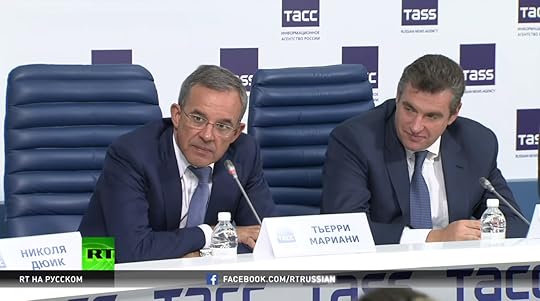
Thierry Mariani (left) and Leonid Slutsky (right) at a press conference in Russia-annexed Crimea, . Mariani refused to answer a question about the amount of the honorarium for his visit to Crimea.
His participation in Zhirinovsky’s WCPF – during the opening session Mariani sat to the left of Zhirinovsky himself – was, however, unlikely the main reason why he went to Moscow in June. Just days before the WCPF, Mariani took part in the International Forum “Development of Parliamentarism” held in the Russian “parliament” on 4-5 June 2018. The Forum was founded by the Chairman of the Russian “parliament” Vyacheslav Volodin and Russia’s Foreign Minister Sergey Lavrov and co-organised by Mariani’s crony Leonid Slutsky.
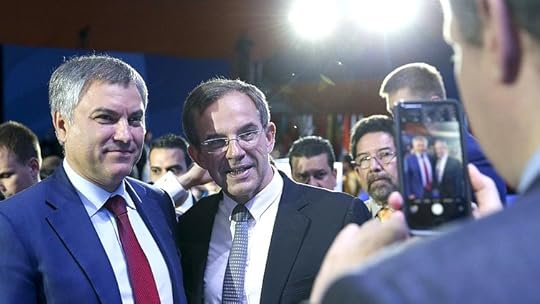
Vyacheslav Volodin (left) and Thierry Mariani (right) at the the International Forum “Development of Parliamentarism”. Moscow, 4 or 5 June 2018.
Tellingly, the LDPR noted on its website that the WCPF was “combined with The World Forum on the development of parliamentarism”, which implies that Zhirinovsky’s party did not really think that it could attract a crowd of participants for their own event (the LDPR would not cover either the flights or accommodation in Moscow) and simply decided to “latch on” on the Forum promising that all the participants of the WCPF would also be invited to Forum in the State Duma. The latter may explain the photos of Russian, German and Danish neo-Nazis in front of the State Duma.

It remains to be seen whether the LDPR will be able to redeem the WCPF from the curse of the totally failed World Congress of Patriotic Parties, but today Zhirinovsky’s “new” international far-right endeavour seems to be a still-born child.
June 16, 2018
Full list of Members of the European Parliament who voted against the resolution on political prisoners in Russia
On 14 June this year, the European Parliament adopted a resolution that, in particular, demanded “that the Russian authorities immediately and unconditionally release Oleg Sentsov and all other illegally detained Ukrainian citizens in Russia and on the Crimean peninsula”.
Oleg Sentsov is a Ukrainian who lived in Crimea. He stayed there after Russia had annexed the Crimean peninsula; shortly after the annexation, Sentsov was arrested, forcibly “granted” a Russian citizenship, falsely charged with terrorist activities and sentenced to 20 years.
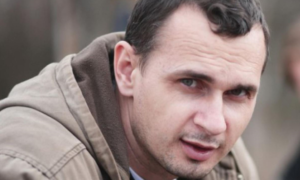
Oleg Sentsov
On 14 May 2018, Sentsov went on an indefinite hunger strike demanding to release all Ukrainian political prisoners held in Russia and Crimea – there are more than 70 of them. Sentsov is dying right now.
Out of 627 Members of the European Parliament (MEPs), 485 voted for the resolution, 76 voted against, and 66 abstained. Here is a full list of MEPs voted against the resolution on political prisoners in Russia and Crimea. It is hardly a coincidence that almost all the MEPs listed here represent the pro-Putin “red-brown alliance”.
NAMEPARTYIDEOLOGYGROUP BulgariaGeorgi PIRINSKIBulgarian Socialist PartyCentre-leftS&D Czech RepublicKateřina KONEČNÁKomunistická strana Čech a MoravyFar-leftGUE-NGL CyprusNeoklis SYLIKIOTISProgressive Party of Working PeopleFar-leftGUE-NGL FranceMarie-Christine ARNAUTUFront nationalFar-rightENFNicolas BAYFront nationalFar-rightENFJoëlle BERGERONIndependent [Front national]Far-rightEFDDDominique BILDEFront nationalFar-rightENFMarie-Christine BOUTONNETFront nationalFar-rightENFSteeve BRIOISFront nationalFar-rightENFAymeric CHAUPRADELes Français Libres [Front national]Far-rightEFDDJacques COLOMBIERFront nationalFar-rightENFMireille D’ORNANOLes Patriotes [Front national]Far-rightEFDDSylvie GODDYNFront nationalFar-rightENFBruno GOLLNISCHFront nationalFar-rightNIJean-François JALKHFront nationalFar-rightENFFrance JAMETFront nationalFar-rightENFPatrick LE HYARICFront de GaucheFar-leftGUE-NGLGilles LEBRETONFront nationalFar-rightENFDominique MARTINFront nationalFar-rightENFBernard MONOTFront nationalFar-rightENFSophie MONTELLes Patriotes [Front national]Far-rightEFDDJoëlle MÉLINFront nationalFar-rightENFYounous OMARJEEL’union pour les OutremerFar-leftGUE-NGLJean-Luc SCHAFFHAUSERRassemblement bleu MarineFar-rightENFMylène TROSZCZYNSKIFront nationalFar-rightENFMarie-Christine VERGIATFront de GaucheFar-leftGUE-NGLMarie-Pierre VIEUFront de GaucheFar-leftGUE-NGL GermanyStefan ECKIndependent [Partei Mensch Umwelt Tierschutz]Far-leftGUE-NGLCornelia ERNSTDie LinkeFar-leftGUE-NGLSabine LÖSINGDie LinkeFar-leftGUE-NGLJörg MEUTHENAlternative für DeutschlandFar-rightEFDDMartina MICHELSDie LinkeFar-leftGUE-NGLMartin SCHIRDEWANDie LinkeFar-leftGUE-NGLHelmut SCHOLZDie LinkeFar-leftGUE-NGLGabriele ZIMMERDie LinkeFar-leftGUE-NGL GreeceNikolaos CHOUNTISPopular Unity [Syriza]Far-leftGUE-NGLGeorgios EPITIDEIOSGolden DawnFar-rightNILampros FOUNTOULISGolden DawnFar-rightNIStelios KOULOGLOUSyriza (Coalition of the Radical Left)Far-leftGUE-NGLKostadinka KUNEVASyriza (Coalition of the Radical Left)Far-leftGUE-NGLKonstantinos PAPADAKISCommunist Party of GreeceFar-leftNIDimitrios PAPADIMOULISSyriza (Coalition of the Radical Left)Far-leftGUE-NGLSofia SAKORAFAIndependent [Syriza]Far-leftGUE-NGLEleftherios SYNADINOSIndependent [Golden Dawn]Far-rightNISotirios ZARIANOPOULOSCommunist Party of GreeceFar-leftNI IrelandLuke Ming FLANAGANIndependentFar-leftGUE-NGL ItalyMara BIZZOTTOLega NordFar-rightENFMario BORGHEZIOLega NordFar-rightENFAngelo CIOCCALega NordFar-rightENFEleonora FORENZALista Tsipras-L’Altra EuropaFar-leftGUE-NGLDanilo Oscar LANCINILega NordFar-rightENFCurzio MALTESELista Tsipras-L’Altra EuropaFar-leftGUE-NGLGiancarlo SCOTTA’Lega NordFar-rightENFBarbara SPINELLIIndependent [Lista Tsipras-L’Altra Europa]Far-leftGUE-NGLMarco ZANNIIndependent [Movimento 5 Stelle]Far-rightENF LatviaAndrejs MAMIKINS“Saskaņa” sociāldemokrātiskā partijaCentre-leftS&D NetherlandsMarcel de GRAAFFPartij voor de VrijheidFar-rightENFAndré ELISSENPartij voor de VrijheidFar-rightENFOlaf STUGERPartij voor de VrijheidFar-rightENFAuke ZIJLSTRAPartij voor de VrijheidFar-rightENF PortugalJoão FERREIRAPartido Comunista PortuguêsFar-leftGUE-NGLAntónio MARINHO E PINTOPartido Democrático RepublicanoCentre-rightALDE/ADLEMarisa MATIASBloco de EsquerdaFar-leftGUE-NGLJoão PIMENTA LOPESPartido Comunista PortuguêsFar-leftGUE-NGLMiguel VIEGASPartido Comunista PortuguêsFar-leftGUE-NGL SpainXabier BENITO ZILUAGAPODEMOSFar-leftGUE-NGLJavier COUSO PERMUYIzquierda UnidaFar-leftGUE-NGLTania GONZÁLEZ PEÑASPODEMOSFar-leftGUE-NGLPaloma LÓPEZ BERMEJOIzquierda UnidaFar-leftGUE-NGLMaria Lidia SENRA RODRÍGUEZAlternativa galega de esquerda en EuropaFar-leftGUE-NGLLola SÁNCHEZ CALDENTEYPODEMOSFar-leftGUE-NGLEstefanía TORRES MARTÍNEZPODEMOSFar-leftGUE-NGLMiguel URBÁN CRESPOPODEMOSFar-leftGUE-NGL United KingdomJanice ATKINSONIndependent [UKIP]Far-rightENFJames CARVERUKIPFar-rightEFDDSteven WOOLFEIndependent [UKIP]Far-rightNI
Anton Shekhovtsov's Blog
- Anton Shekhovtsov's profile
- 17 followers



